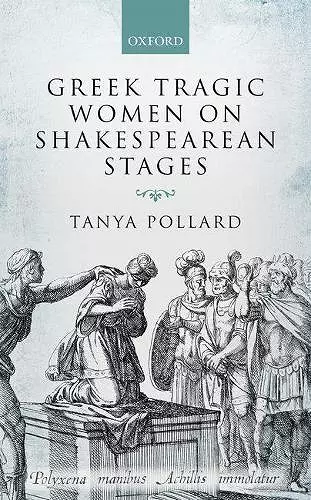Greek Tragic Women on Shakespearean Stages
Format:Hardback
Publisher:Oxford University Press
Published:21st Sep '17
Currently unavailable, and unfortunately no date known when it will be back
This hardback is available in another edition too:
- Paperback£29.49(9780192871022)

Greek Tragic Women on Shakespearean Stages argues that ancient Greek plays exerted a powerful and uncharted influence on early modern England's dramatic landscape. Drawing on original research to challenge longstanding assumptions about Greek texts' invisibility, the book shows not only that the plays were more prominent than we have believed, but that early modern readers and audiences responded powerfully to specific plays and themes. The Greek plays most popular in the period were not male-centered dramas such as Sophocles' Oedipus, but tragedies by Euripides that focused on raging bereaved mothers and sacrificial virgin daughters, especially Hecuba and Iphigenia. Because tragedy was firmly linked with its Greek origin in the period's writings, these iconic female figures acquired a privileged status as synecdoches for the tragic theater and its ability to conjure sympathetic emotions in audiences. When Hamlet reflects on the moving power of tragic performance, he turns to the most prominent of these figures: 'What's Hecuba to him, or he to Hecuba/ That he should weep for her?' Through readings of plays by Shakespeare and his contemporary dramatists, this book argues that newly visible Greek plays, identified with the origins of theatrical performance and represented by passionate female figures, challenged early modern writers to reimagine the affective possibilities of tragedy, comedy, and the emerging genre of tragicomedy.
Not only does this fidelity attest to Pollard's scholarly precision and authority in dealing with Greek, but it also commends the scrupulousness of her Oxford editors in ensuring its accurate reproduction. * Nick Moschovakis, Modern Philology *
In Greek Tragic Women on Shakespearean Stages, Tanya Pollard presents an erudite study of the influence of classical heroines on early modern drama. ... One of the joys of Pollard's work is her smart and subtle readings of Greek word choice, using such micro-analysis to add force to her overarching argument. Another is her crucial decision to emphasize the role of both female characters and real women in shaping the Renaissance's own heroes. * Miranda Fay Thomas, Times Literary Supplement *
The book's focus on mythologized bereaved mothers, sacrificial virgins, and the motherdaughter dyad - all central to the Greek drama she examines - enables not only new readings of some of the most thoroughly studied early modern texts, such as Shakespeare's Hamlet (ca. 1600), but also a better understanding of the playwrights' ideas concerning gender and female power, intertextuality, dramatic collaboration, and the development of theater and its genres. * Lea Puljcan Juric, Fordham University, Early Modern Women: An Interdisciplinary Journal (EMWJ) *
Pollard's important contributions to existing data, such as those collected in Oxford University's Archive of Performance of Greek and Roman Drama, pave the way for even more precise mappings of Greek literary influence in early modern English culture. * Lea Puljcan Juric, Fordham University, Early Modern Women: An Interdisciplinary Journal (EMWJ) *
Pollard's presentation of the affective impact of the grieving mother/sacrificial daughter pairing as the key inheritance of Greek tragedy for Renaissance writers, however, is powerful and compelling. The book represents an important contribution to ongoing debates over the significance of Greek to English literature in the period, and will undoubtedly serve to open up the field still further. * Carla Suthren, Early Theatre *
Tanya Pollard's welcome new book presents a powerful case for reading Shakespeare's plays as responses to ancient Greek drama. ... Greek Tragic Women on Shakespearean Stages brings back to life ghosts even a non-believer will find strangely haunting. * Timothy Saunders, Bryn Mawr Classical Review *
There is much to admire in the detail of Pollard's book * John Drakakis, Renaissance Quarterly *
"Pollard [...] does not focus on female poets and translators but investigates the entire record of the publication, reception and dramatic influence of Greek tragedy in early modern England. Her findings are significant, especially in relation to female roles [...] Pollard's major innovation is to argue for the impact of Greek tragedy on popular theatre. It has long been recognised that the 'university wits' of the generation before Shakespeare had a classical education. The consequences have been looked for in the contribution of Virgil, Ovid and other Latin authors to the work of Marlowe, Greene and the rest. Pollard shows that Greek was also part of their formation. * London Review of Books *
In this clearly written and thoroughly researched book, Pollard argues that ancient Greek tragedies influenced sixteenth-century theater significantly more than previously thought. Pollard offers evidence of their availability and popularity during the early modern period and includes several useful appendices listing sixteenth-century editions of Greek plays in Greek, Latin and vernacular languages as well as performances of plays by or based on Greek playwrights. Pollard finds additional proof in the echoes of Greek tragic icons in a variety of sixteenth-century plays. * Classical World *
Summing Up: Highly recommended. Upper-division undergraduates through faculty. * Choice *
- Winner of Winner of the 2017 Roland H. Bainton Literature Book Prize, awarded by the Sixteenth Century Society and Conference (SCSC)..
ISBN: 9780198793113
Dimensions: 223mm x 142mm x 26mm
Weight: 556g
342 pages